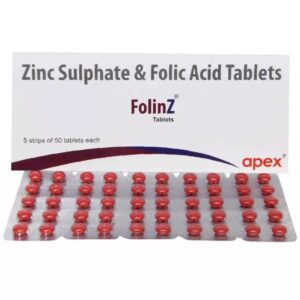FOLIC ACID + ZINC SULPHATE
Folic Acid: Folic Acid, also known as Vitamin B9, is a water-soluble vitamin that is essential for various bodily functions. It is mainly used as a dietary supplement to treat or prevent folate deficiency and certain types of anemia.
Mechanism of Action: Folic Acid is converted into its active form, methyltetrahydrofolate, in the body. It plays a crucial role in DNA synthesis, repair, and cell division. Additionally, it is necessary for the production of red blood cells and the proper functioning of the nervous system.
Use: Folic Acid is prescribed for the treatment of folate deficiency anemia, particularly during pregnancy, as it helps support fetal development and prevent birth defects like neural tube defects. It may also be recommended for individuals with certain medical conditions that interfere with their ability to absorb or utilize folate effectively.
Dose: The recommended daily dose of Folic Acid varies depending on the individual’s age, sex, and specific medical condition. In general, the usual adult dose is 400-800 micrograms per day. Pregnant women or those planning to become pregnant may require higher doses, typically 600-800 micrograms per day.
Side Effects: Folic Acid is generally considered safe and well-tolerated when taken within the recommended dosage range. However, some individuals may experience mild side effects such as nausea, bloating, gas, or a bitter taste in the mouth. In rare cases, allergic reactions or skin rash may occur. It is important to note that high doses of Folic Acid can mask Vitamin B12 deficiency, which could lead to nerve damage. Therefore, it is important to take Folic Acid under the guidance of a healthcare professional.
Zinc Sulphate: Drug Name: Zinc Sulphate
Use: Zinc sulphate is a medication used in the treatment and prevention of zinc deficiency. It may be prescribed to individuals who have dietary restrictions, malabsorption disorders, or underlying conditions that increase their risk of developing zinc deficiency.
Mechanism of Action: Zinc is an essential mineral that plays a vital role in numerous physiological processes. It functions as a cofactor for many enzymes and is involved in DNA synthesis, protein synthesis, wound healing, and immune function. Zinc sulphate provides the body with elemental zinc, which is necessary for these processes.
Dose: The recommended dose of zinc sulfate varies depending on the specific indication. Generally, the usual dose for treating zinc deficiency in adults is 220 to 440 mg of zinc sulfate per day divided into two to three doses. The dosage for children is typically based on their weight. It is crucial to follow the dosage instructions provided by the healthcare provider.
Side Effects: Like any medication, zinc sulphate can cause side effects. Common side effects may include nausea, vomiting, stomach upset, diarrhea, and a metallic taste in the mouth. These side effects are usually mild and transient. Taking zinc supplements with food can help reduce gastrointestinal discomfort. Rarely, zinc toxicity can occur with long-term and excessive use of zinc sulfate, leading to symptoms such as abdominal pain, anemia, kidney damage, and copper deficiency. It is important to consult a healthcare professional before starting any supplements to ensure the appropriate dose and duration of treatment.
Note: This information is provided for educational purposes and should not be considered as medical advice. It is essential to consult a healthcare professional for personalized recommendations and dosage instructions based on individual circumstances.

